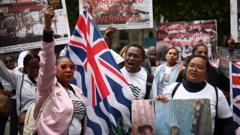Under the agreement, the UK will pay Mauritius an average of £101 million annually for the next 99 years, a move that has incited considerable political debate and legal challenges.
**UK Strikes Controversial £101m-a-Year Agreement for Chagos Islands Handover**

**UK Strikes Controversial £101m-a-Year Agreement for Chagos Islands Handover**
The UK government has finalized a significant deal with Mauritius involving the handover of the Chagos Islands while retaining military access to Diego Garcia.
The UK government, led by Prime Minister Sir Keir Starmer, has entered into a £101 million-a-year arrangement to transfer the Chagos Islands to Mauritius while securing a lease for a crucial military base on Diego Garcia for a period of 99 years. This agreement comes amid heightened concerns regarding national security and international relations, particularly with China.
Starmer asserted that the deal is vital for maintaining the long-term viability of the military base which plays a pivotal role in the UK's defense strategy. In exchange for the handover, the UK government will compensate Mauritius a total of £3.4 billion over the lease term when accounting for inflation and other financial factors.
Conservative party leaders have criticized the deal, labeling it "an act of national self-harm" that could compromise the UK’s strategic position against growing Chinese influence. The agreement was solidified after overcoming a legal roadblock raised by two Chagossian women, who argued they had been denied a say in their homeland's future.
The deal specifies control measures around Diego Garcia, including a 24-mile exclusion zone to prevent foreign military establishments and ensures a right of veto for the UK on any developments in the area. The treaty remains pending approval from both the UK and Mauritian parliaments before it can take effect.
In response to the deal, Mauritius Prime Minister Navin Ramgoolam has celebrated gaining sovereignty over the Chagos, emphasizing the need for resettlement programs for Chagossians. However, many in the Chagossian community have expressed distress over the agreement, fearing a loss of their rights and negative implications for their future.
While the US Secretary of State has welcomed the treaty as beneficial for regional security, vocal opposition persists within the UK parliament, with critics questioning the strategic implications of partnering with Mauritius. Following the court decision allowing the deal to proceed, Chagossians expressed deep disappointment, emphasizing their right to self-determination.
The islands, originally part of Mauritius, were separated in 1965 during British colonial rule, a move that has been widely condemned. The ongoing debate highlights the complex layers of colonial legacy, national interests, and the rights of indigenous populations as the UK contends with rising pressure to address these longstanding historical injustices.
Starmer asserted that the deal is vital for maintaining the long-term viability of the military base which plays a pivotal role in the UK's defense strategy. In exchange for the handover, the UK government will compensate Mauritius a total of £3.4 billion over the lease term when accounting for inflation and other financial factors.
Conservative party leaders have criticized the deal, labeling it "an act of national self-harm" that could compromise the UK’s strategic position against growing Chinese influence. The agreement was solidified after overcoming a legal roadblock raised by two Chagossian women, who argued they had been denied a say in their homeland's future.
The deal specifies control measures around Diego Garcia, including a 24-mile exclusion zone to prevent foreign military establishments and ensures a right of veto for the UK on any developments in the area. The treaty remains pending approval from both the UK and Mauritian parliaments before it can take effect.
In response to the deal, Mauritius Prime Minister Navin Ramgoolam has celebrated gaining sovereignty over the Chagos, emphasizing the need for resettlement programs for Chagossians. However, many in the Chagossian community have expressed distress over the agreement, fearing a loss of their rights and negative implications for their future.
While the US Secretary of State has welcomed the treaty as beneficial for regional security, vocal opposition persists within the UK parliament, with critics questioning the strategic implications of partnering with Mauritius. Following the court decision allowing the deal to proceed, Chagossians expressed deep disappointment, emphasizing their right to self-determination.
The islands, originally part of Mauritius, were separated in 1965 during British colonial rule, a move that has been widely condemned. The ongoing debate highlights the complex layers of colonial legacy, national interests, and the rights of indigenous populations as the UK contends with rising pressure to address these longstanding historical injustices.




















